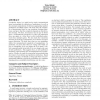116 search results - page 20 / 24 » Anonymity-Proof Voting Rules |
108
Voted
ESAW
2008
Springer
15 years 3 months ago
2008
Springer
We consider a resource access control scenario in an open multi-agent system. We specify a mutable set of rules to determine how resource allocation is decided, and minimally assum...
130
click to vote
TSMC
2008
15 years 1 months ago
2008
In this paper, we present an extensive study of 3-D face recognition algorithms and examine the benefits of various score-, rank-, and decision-level fusion rules. We investigate f...
112
click to vote
ATAL
2008
Springer
15 years 3 months ago
2008
Springer
Complexity theory is a useful tool to study computational issues surrounding the elicitation of preferences, as well as the strategic manipulation of elections aggregating togethe...
113
click to vote
AAAI
2006
15 years 3 months ago
2006
Voting (or rank aggregation) is a general method for aggregating the preferences of multiple agents. One important voting rule is the Slater rule. It selects a ranking of the alte...
ICML
2003
IEEE
16 years 2 months ago
2003
IEEE
In this paper we present a simple to implement truly online large margin version of the Perceptron ranking (PRank) algorithm, called the OAP-BPM (Online Aggregate Prank-Bayes Poin...

